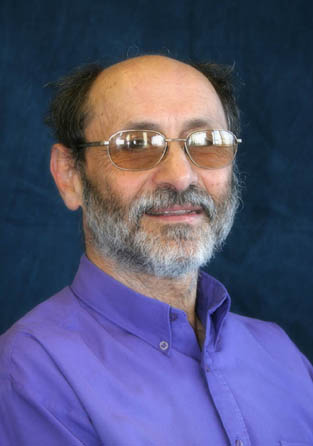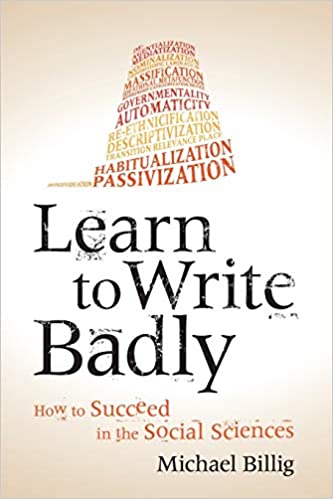Michael Billig is a professor of social sciences at Loughborough University, Leicestershire, UK. He is the author of several books, including “Learn to Write Badly: How to Succeed in the Social Sciences”, “Freudian Repression: Conversation Creating the Unconscious”, and “Arguing and Thinking: A Rhetorical Approach to Social Psychology”. There are also a few interviews that are available online (here is one example), but I could not find any that were intended specifically for young academics. The following interview, therefore, is intended first and foremost for graduate students in the social sciences.
Davood Gozli: Thank you for agreeing to this interview, Professor Billig. Given that many of my colleagues in experimental psychology may not be familiar with your work, let’s begin with a general question. How would you describe your approach to psychology? What are some of the goals that have been motivating your work?
Michael Billig: I am not sure that I have an ‘approach’ in the sense which that word tends to be used. I don’t have a set theory or methodology with which I approach various topics. However, I do tend to approach topics, which interest me, with a similar style. I tend to become interested to the point of obsession in a particular topic, often because I want to find out about something that I do not know much about. As a start I read as widely as I can about the topic. In effect this has often led me to read more social scientific, historical and philosophical works than purely psychological works. In consequence, my work tends not to fit a neat disciplinary framework and certainly not the framework of experimental psychology. However, I am also interested in the ways that people use rhetoric and language generally, and I often find myself investigating psychological problems through the close examination of rhetoric. In this regard my analyses are often qualitative, but I don’t see doing qualitative or quantitative analyses as a matter of principle.
DG: I learned a lot from your book, “Learn to Write Badly: How to Succeed in the Social Sciences”. Even though I knew about Thomas Kuhn’s notion of the disciplinary matrix, I became aware of it in a much more personal way after reading your book, and noticed some of the ways the disciplinary matrix affects my own practices. Please tell us about what motivated the writing of this book.
MB: I give a short account in the opening chapter of the book. I recount how, as a postgraduate student, I had great difficulty in understanding, let alone use, the technical concepts of experimental social psychology. I would try to translate them into the sort of simple English that I understood and how sometimes, as I turned the big words into ordinary words, the meaning seemed to disappear. At the time, I found that I lost confidence and wondered whether I could ever become a ‘proper’ academic. Over the years, the difficulty has increased rather than decreased, but now I don’t feel it to be a sign of failure. I wanted to write a book that analysed why so many academics in the social sciences – and I include psychology in the social sciences – use big words and what is wrong with using big words, when smaller ones will suffice. I did not want to write a book that just complained about academic language: I wanted to write a book which analysed current rhetorical practices and to show exactly what is wrong linguistically with such practices. To this end, I needed to engage in discursive and linguistic analyses.
DG: In the present time, writing and publishing are – for good or ill – necessities for academics. In such a condition, how can we begin to increase the relevance, accessibility, quality of our writing? Are there any specific writing exercises that you endorse?
MB: It is often assumed that technical writing is more precise than ordinary language. In my view, the reverse is often the case, especially when it comes to writing about human actions. If you use currently fashionable technical phrases, which typically are nominal phrases, you often do not have to make your meaning precise – you just take a phrase which sounds precise but may be used in all manner of imprecise ways. If you use simpler language to describe actions, you often have to stipulate exactly what you mean – stipulating who did what and how. I would not advocate specific writing exercises but would urge all young academics to write as simply as they can, using, for example, active verbs rather than passive sentences.
DG: Your own writing is extraordinary. You write in a clear, engaging, and persuasive way. In my experience, many of the writers who take a critical stance against the mainstream psychology are rather difficult to read. Is obscurity part of the disciplinary matrix of the critical approaches or is that a coincidence?
MB: There are some social scientists who believe that ordinary language is ideologically compromised and that to be critical of conventional ways of thinking, you have to use special language. Hence some social critics have used tortuous language. However, I think that their position is wrong on two counts. Today, many of those who wield social and economic power use specialist language to reinforce their power, rather than ordinary language. You only have to think of management jargon. In these conditions, the language of ordinary people may not be so ideologically conservative. Second, language is not a set matrix of meanings which are imposed upon the users of the language. We use language to argue, to criticize and to say ‘no’. And it is self-regarding and erroneous to think that only those equipped with special, critical terminology can do these things.
DG: On the topic of critical psychology, in several places you have made the observation that a critical approach can give rise to a disciplinary matrix of its own, with its own new terminology, textbooks, and a body of literature that becomes increasingly insulated, reducing contact with the original target of the critique. Should critical approaches regard disciplinarity as an obstacle?
MB: Yes they should aware that a ‘critical approach’ can become a new orthodoxy, which students have to learn uncritically. William James stressed the importance of being undisciplined. In my experience, the best way of avoiding being orthodox is to read widely. If you just read what everyone else in your discipline or sub-discipline is reading, then you will, as likely as not, end up thinking like everyone else. But if you read eclectically, then you have a chance of acquiring a distinctive set of ideas.
DG: Your book, “The Hidden Roots of Critical Psychology: Understanding the Impact of Locke, Shaftesbury, and Reid” tells a captivating story of three philosophers who remain surprisingly relevant to the field of psychology to this day. How did you discover Shaftesbury? And how did that discovery lead to the writing of the book?
MB: Prior to writing ‘Hidden Roots’ I wrote a book on humour and I came across Shaftesbury through my reading about different theories of humour. Shaftesbury had written about the importance of humour, and stressed that he did not mean vulgar humour but the humour to be found in gentleman’s clubs. I mocked this snobbish attitude. But then I read a bit more and realized that I had been unfair to Shaftesbury – not least because he was not referring to ‘gentlemen’s clubs’ in the modern sense. I had a guilty conscience for mocking him so easily. And the more I read about him and by him, the more I appreciated his originality and depth. So, ‘The hidden roots’ was really an apology but it was an apology which I enjoyed making.
DG: Aside from Shaftesbury and Reid, who are some other forgotten figures in the history of psychology?
MB: Yes although they tend to be figures forgotten by the history of psychology, often because they formulated psychological ideas which were not taken up by psychologists or found their way unnoticed into the thinking of major, better known, later figures. Abraham Tucker is one such figure. He was an eighteenth century English thinker, who lived a very intellectually isolated life. He was ignored in his own day and by later generations. His book The Light of Nature Pursued, however, formulated a view of the mind which in many respects anticipated ideas to be found in William James, including the key idea of consciousness being like a stream. I wrote an article in praise of Abraham Tucker in Theory & Psychology three or four years ago. I’m sure that there are many other neglected delights to be found.
DG: What are some of your favorite books? And, what is your favorite Michael Billig book?
MB: Over the years I have enjoyed and been influence by many different books. I have loved reading William James’s Principles of Psychology and many of Freud’s works, especially his Five Lectures on Psychoanalysis and his Studies on Hysteria. I was greatly influenced by Hannah Arendt, especially Eichmann in Jerusalem, which changed the way I thought about the social world, and by Wittgenstein’s Philosophical Investigations. It has been wonderful to have been paid to read. But that has meant being able to read works that have not been enjoyable to read. The most extreme example is that I read Mein Kampf when I was studying fascism.
Favourite books are those one reads and re-reads. I don’t read and re-read my own works.
DG: Do you have any other general advice for the young academics who will read this interview?
MB: Be brave and do things for their own sake rather than because you think they will be useful for your ‘career’. Above all try to read widely. By reading widely, you can ‘meet’ some extraordinary thinkers.
DG: I am grateful to have discovered you and your work. And I thank you for this opportunity.
Also read: Inheriting the Past (A Review of Michael Billig’s “The Hidden Roots of Critical Psychology: Understanding the Impact of Locke, Shaftesbury, & Reid”)


1 thought on “Interview with Michael Billig”
Comments are closed.